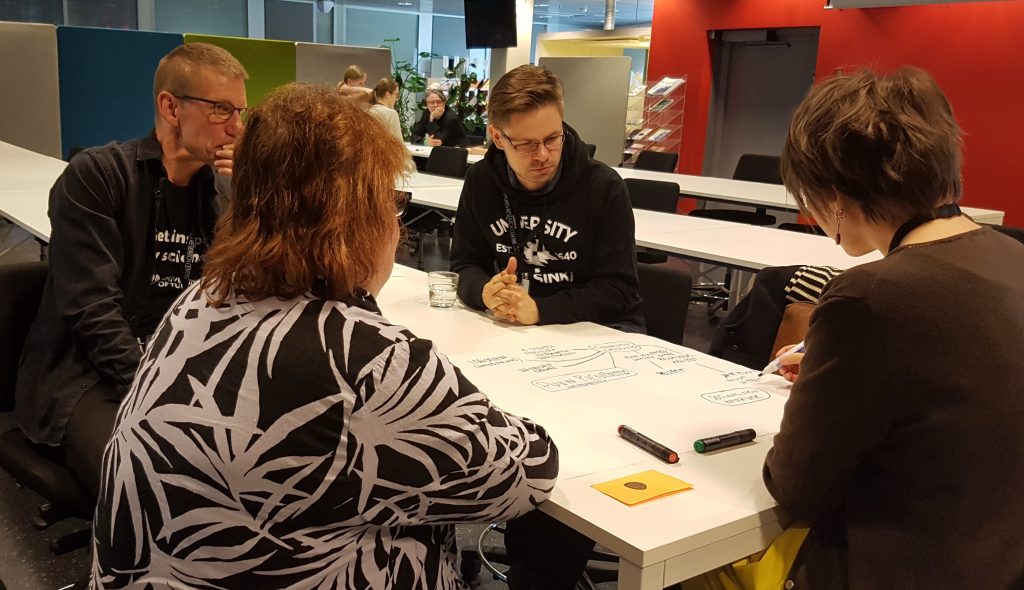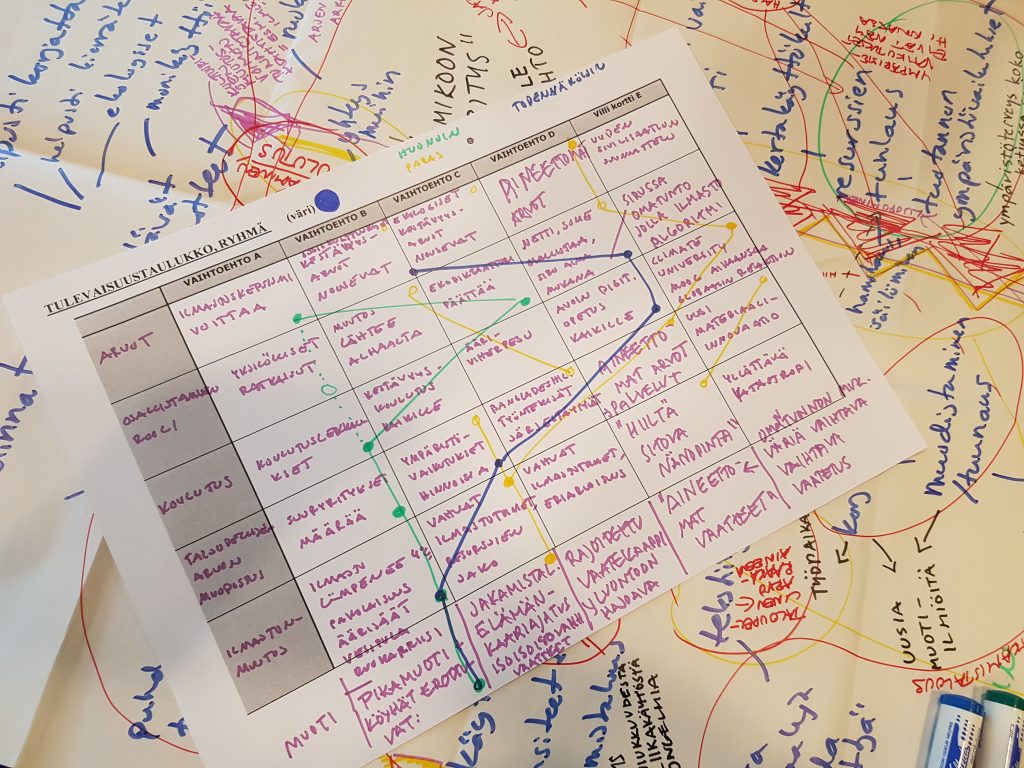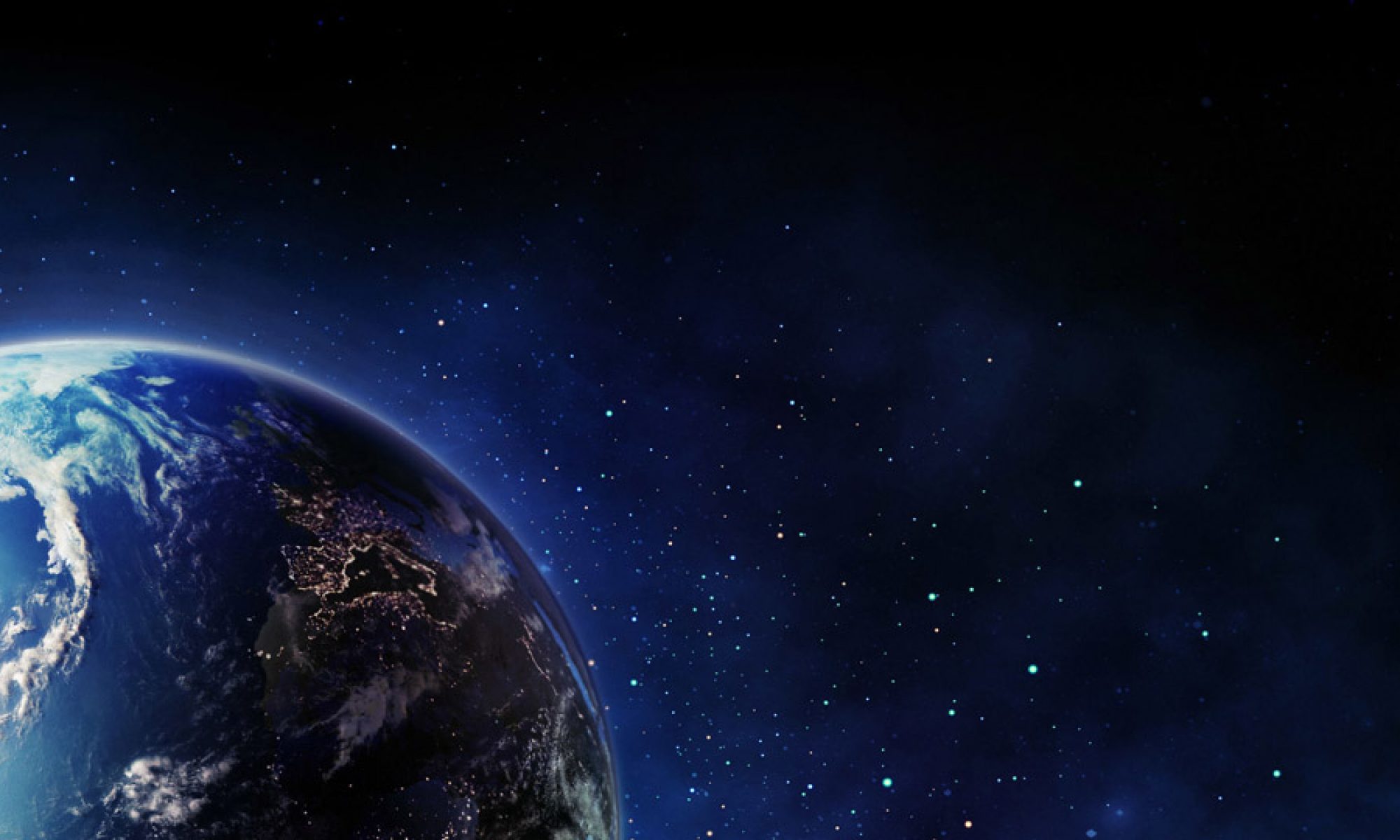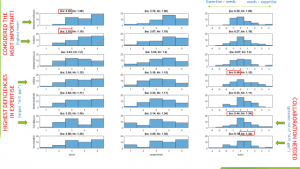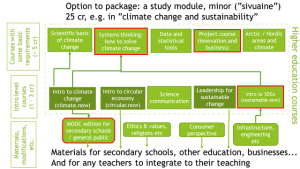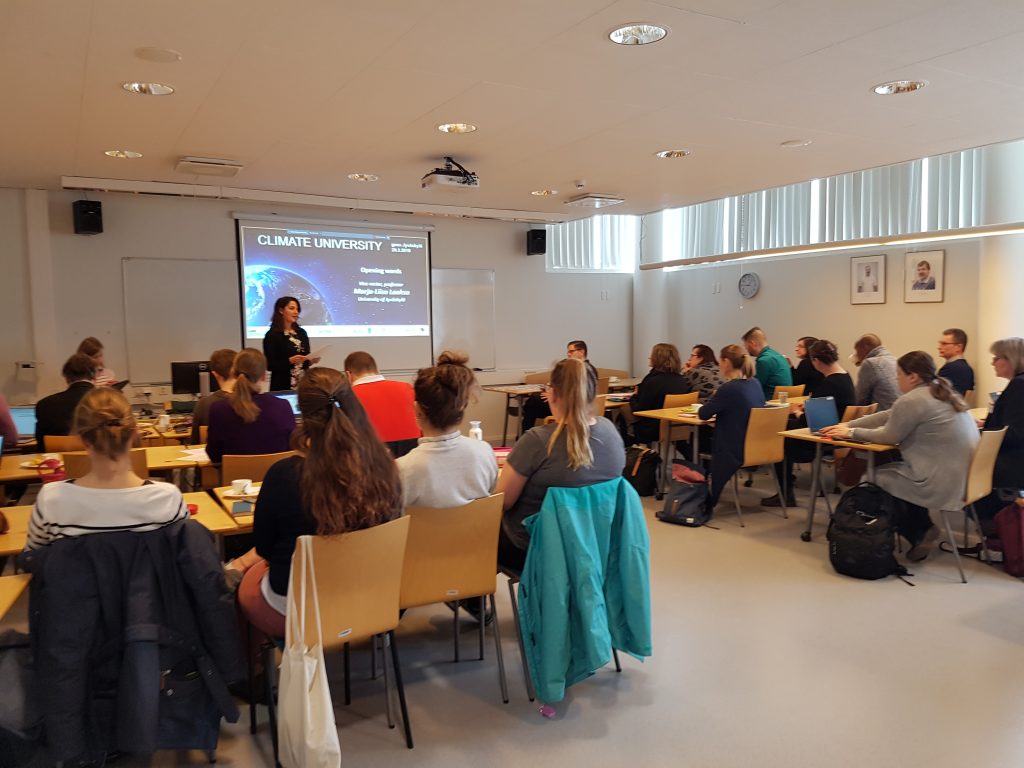The first Climate University workshop was organized in Tiedekulma, in Helsinki, in November 2018. Below, you will find a short summary of the main events, discussions and conclusions of this kick-off workshop.
Opening of the event
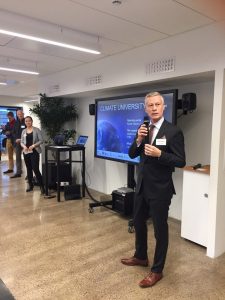
The event was opened by Chancellor Kaarle Hämeri and Chief Digital Officer (CDO) Jaakko Kurhila from University of Helsinki. Chancellor Hämeri highlighted the mission of universities of bringing science to the society – this aspect is also at the heart of our project of bringing together actors from various branches of the society with a common agenda of answering the climate and sustainability challenges in the field of education.
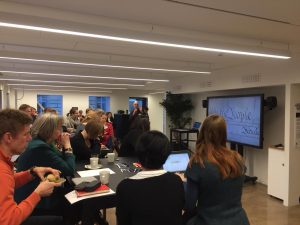
CDO Kurhila proposed an idea of a digital constitution for universities, an idea that is certainly timely at a moment when in addition to digital materials and services, as also education is adapting more and more online–oriented teaching and learning methods.
Orientation and orienteering: what is needed to solve the sustainability crisis?
The first activity of the first day was “urban orienteering”, where the participants were tasked to find the answer for the underlying, major question of the entire CU project:
What kind of expertise (education) is needed in the near future, in order to answer the challenges of climate change and sustainability?
To answer this, the participants toured the city in small groups and interviewed people from various government institutes, NGOs, economic experts and many other relevant societal actors.
T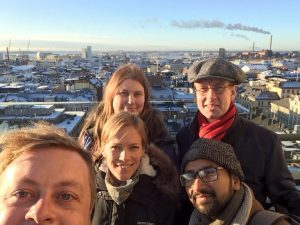 he weather favored us, with a sunny day and overall it seemed the orienteering activity was well received!
he weather favored us, with a sunny day and overall it seemed the orienteering activity was well received!
The thoughts and findings of the orienteering were summarized in the afternoon. The groups’ reports were thoughtful and varied, but some main themes seemed to emerge. In synthesis, the expertise and skills that were found to be the ones most acutely needed were:
· Multidisciplinary – crossing the traditional borders of natural (or technical, engineering) vs human (sociological) sciences is necessary
· Holistic understanding of the challenges is required and systems thinking is important. It is important to try to see the bigger picture and not look at the challenges from a single, narrow angle
· Impactful decisions are based on data and statistics, to but it is equally important to keep in mind the personal, human perspective (choices, values, ethics, principles) and create an emotional connection to the challenges, to bring about change in the society
· Science communication is key. Academic knowledge needs to be communicated to the decision makers, but academics equally need to understand political decision-making
· Including the private sector and markets in answering the challenges and considering finances and the economics is needed, and (green technology) business opportunities and innovations need to be recognized. However, focusing too much on innovations and technical solutions may hinder grasping the bigger picture of the challenges.
· Consumer perspective is important to consider – green choices need to be made easy. Sustainability education (in e.g. circular economy) in schools is necessary, to educate responsible citizens and customers of the future.
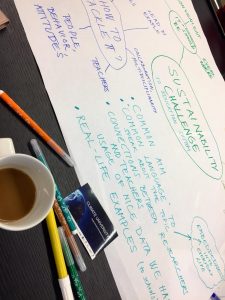
We were very impressed with the results of this activity, and the thoughtful analysis of the groups, and proposed these topics also to be taken as the basis for our needs assessment that was recently conducted!
Innovation workshop: how can universities and private sector come together to advance education?
On Tuesday afternoon, we delved into the topic of collaborating over the traditional borders of academia and private sector. We had a delightfully broad representation from our partner companies and other organizations (Sitra, Climate Leadership Coalition, NollaE oy, Useless Company, Demos Helsinki, ESRI Finland, AW-Energy, CGI, Pöyry, Nordea, Climate-KIC), who first presented their perspectives on climate and sustainability challenges and prospects for collaboration on educational activities.
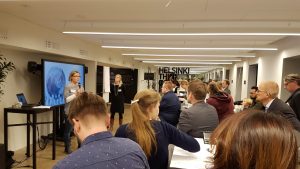
We then divided the participants to groups which included representatives both from education sector and businesses, and tasked them to come up with forms of collaboration that would be beneficial for both the companies and the universities. Again, the outcome was a thoughtful discussion that identified many of the challenges but also potential solutions for them. As a summary, the main conclusions were the following.
- There are incentives for the enterprises to collaborate with schools and universities (promote teaching relevant skills, public relations, research and development etc.).
- One major challenge is the time requirements for co-operation, both for the often busy company representatives and the teachers. There should be a pre-planned template for the collaboration, so that it is quick and easy for the companies to evaluate the collaboration proposal and say yes or no.
- Collaboration should include genuine interaction between the enterprises and the students and it should include regular meetings. Students and company contacts should both be included in planning of the co-operative projects.
- As a concrete proposal: project work based on challenges presented by the companies. Student groups should be multi-disciplinary.
We hear these messages forward, and will include these challenges in the needs assessment questions. Our aim is to try to refine a functional concept for how a fruitful collaboration could best be best.
To wrap up this very positive first workshop day, we had workshop dinner, (made entirely of leftover raw materials!) at restaurant Loop in Lapinlahti.
Climate.now
Climate.now is an online course, or learning material, provided at the University of Helsinki MOOC platform: www.climatenow.fi (in Finnish Ilmasto.nyt, www.ilmastonyt.fi). Anyone can study the material for free any time and get a MOOC certificate from the platform. Eight universities in Finland offer courses based on the material: University of Helsinki – also via open university, LUT University, Aalto University, Metropolia University of Applied Sciences, University of Jyväskylä, University of Eastern Finland, University of Oulu, and University of Tampere. In the Climate.now workshop we heard experiences from these courses. We also heard that the material has been used by other organizations, like Protect our winters and Mothers in business. We discussed the opportunity to make Climate.now more international, and the opportunity to make a shorter easily accessible version to attract more laymen.
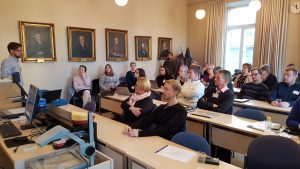
Climate University Goes to Schools
As a parallel workshop session, we had an event where we discussed potential for co-operation between different levels of education in Finland, with representatives from basic to university education. We had short presentations on past and existing successful activities in schools, related to climate and sustainability, and got a wide range of positive examples of such education inspiringly arranged!
In the main discussions of the school workshop, the following conclusions were reached:
-
The Climate University community should influence the planning of the upcoming, new national curricula for the Finnish schools. We should promote including climate and sustainability topics in the school curricula. We should prepare a petition on this for the government officials in charge of the preparation work (by February 2019). Such a petition should be signed by the university representatives, but also widely by companies and NGO’s.
-
In was noted most teachers use existing course books, and may be hesitant to use online material. It was proposed the Climate University community could endorse school textbooks that cover the environment / sustainability topics, with some sort of a “seal of approval”. Same is applicable for online material, and coordination / collection / pre-selection of online material would be beneficial.
-
Themed periods of “phenomenon learning” could be based on climate and sustainability topics. These should cover a wide range of subjects (both natural and human sciences topics).
-
Climate / sustainability university level courses should be tailored to the needs of schools (lyceum) education. The three components that should be considered are: 1) students should get course credits at their schools (lyceum), or a diploma 2) the students should get university level study credits 3) completing a number of these studies should form a flexible pathway to university studies.
Again, these topics will be included and furthered, and we selected the main ones to be further examined for our needs assessment survey. The group concurred that we should start a working group to promote inclusion of climate and sustainability topics to the school curriculums in 2019 and that a permanent network or a forum of some sort would be needed to effectively communicate.
In these constructive and optimistic spirits, we were happy to conclude the opening workshop of our Climate university project! We would like to once more wholeheartedly thank all the participants who helped us make this event the positive experience it definitely was! We are looking forward to the next workshop, held in Jyväskylä, with more information in the next blog post!
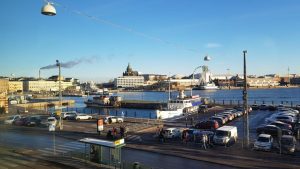
Mikko and Laura
